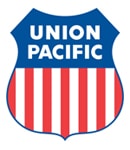Fort Worth-based BNSF Railway plans to hire 5,000 workers this year as part of a $5 billion investment in the railroad, Carl Ice, the company’s new president and CEO, said this morning during an interview on CNBC.
Ice, who recently took over the CEO post from Matt Rose, said the new jobs will be spread across the railroad’s many functions but that the biggest number will be in train crews to serve its growing business. The company is also adding 500 locomotives and recently announced plans to purchase 5,000 next-generation tank cars to haul crude oil from fields such as the Bakken Shale.
Read the complete story at The Star-Telegram.
Tag: jobs
Fort Worth-based BNSF Railway plans to hire 5,000 workers this year as part of a $5 billion investment in the railroad, Carl Ice, the company’s new president and CEO, said this morning during an interview on CNBC.
Ice, who recently took over the CEO post from Matt Rose, said the new jobs will be spread across the railroad’s many functions but that the biggest number will be in train crews to serve its growing business. The company is also adding 500 locomotives and recently announced plans to purchase 5,000 next-generation tank cars to haul crude oil from fields such as the Bakken Shale.
Read the complete story at the Star-Telegram.

“This year’s projected record investments continue a decades-long trend of private railroad dollars that sustain America’s freight rail network, so taxpayer’s don’t have to,” said AAR President and CEO Edward R. Hamberger. “The result is a rail network that is the envy of the world, serving both freight and passenger railroads, and this massive private financial commitment is a demonstration of the industry’s resolve to never stop improving.”
Hamberger noted that freight railroads have invested approximately $550 billion of their own money into the rail network since 1980, including $115 billion in the past five years alone. From upgrades to bridges and tunnels to new tracks and facilities, freight rail infrastructure is constantly maintained and upgraded to meet the demands of an evolving economy. Thanks to a strong rail network infrastructure, railroads in recent years have been able to successfully meet increased demand for intermodal shipping, a booming domestic energy market and more. The industry’s investments also include implementing the latest safety technology across the rail network.
“The rail industry is committed to safety and we’re investing record amounts to implement safety enhancing technology across the network,” Hamberger said. “Railroads are working to deliver a safe, modern and efficient rail network that can reliably serve our customers and communities. And at the same time, this spending creates jobs for more American workers.”
The freight railroads estimate they will hire more than 12,000 employees in 2014, up from a projected 11,000 new hires in 2013. Company job listings can be accessed via www.aar.org/jobs.
“Freight rail is a great industry for a potentially life-long career with one of our great railroad companies,” Hamberger said. “America’s railroads also have a long history of hiring veterans, and railroad careers rank among the best for military veterans and their families.”
Tomorrow, advocates and representatives from the freight rail community will participate in Rail Day 2014, meeting with policymakers and elected representatives on Capitol Hill to stress the importance of America’s railroads to our economy. “Today’s news of record investments and steady hiring demonstrates how America’s economy rides the rails,” Hamberger said. “That’s a message we’re eager to share.”

“Union Pacific understands and values the skills veterans bring to the workforce,” said Roy Schroer, Union Pacific’s vice president of Human Resources. “The military instills a strong work ethic and world view that strengthens our organization at all levels.”
In 2013, Union Pacific hired more than 800 military veterans, including 95 disabled veterans. These veterans make up approximately 25 percent of all new hires in 2013. During the last five years, 24 percent of Union Pacific’s hires have been veterans, and overall, veterans comprise about 20 percent of the company’s workforce. Leadership and teamwork skills, wide-ranging areas of expertise gained during their service, familiarity with nontraditional working hours and experience working outdoors are just some of the characteristics that make military personnel a good fit with jobs at Union Pacific.
Union Pacific actively recruits veterans through its involvement with military transition offices, military education offices, reserve and National Guard units, career fairs, information sessions, employer panels, resume review assistance and by serving on local military committees and boards.
The railroad’s progressive reservist policy is one example of how Union Pacific supports its reserve, active duty and veteran employees, and their families. All employees called to active duty are compensated for any difference between military and company pay, and Union Pacific continues benefit coverage for deployed employees and their families. In addition, the employee resource group UPVETS is devoted to attracting, developing and retaining employees who are military veterans.
Union Pacific frequently is recognized for its commitment to military veterans. The company received the inaugural Hiring Our Heroes Award for Post 9/11 Veteran Employment and Internships from the National Chamber Foundation and has been named a military-friendly employer 10 times by G.I. Jobs. The company is a member of the Army Reserve’s Employee Partnership Initiative, supports the Army Partnership for Youth Success program, and is a past recipient of the Freedom Award, the U.S. government’s highest employer recognition.
Union Pacific offers many unique employment opportunities for veterans, including train crew, diesel mechanics, diesel electricians, assistant signal workers and track laborers. Engineers in the computer science, electrical, civil and mechanical areas will find leadership opportunities in the Information Technology department or through the company’s Operations Management Training Program. Interested candidates can view job postings at www.UP.jobs.

Canadian Pacific Railway has furloughed approximately 30 workers in recent months from its operation in Thief River Falls, Minn., according to union officials.
The job cuts are among roughly 90 furloughs at CP sites across Minn. that the United Transportation Union has counted since October 2012, part of what the union says are aggressive job cuts that followed leadership changes in the company at that time.
“We’re not happy about it,” said Phillip J. Qualy, SMART-UTU Minnesota legislative director.
Read the complete story here.

Combined with the tens of thousands of messages from others, the House Republican leadership has pulled back a planned vote Feb. 17 on a draconian transportation bill that would cost jobs, menace transportation safety and threaten the future of Railroad Retirement.
As phone call, email and fax communications flooded House offices in Washington – many from UTU members asked to voice their concern — House Speaker John Boehner (R-Ohio) delayed at least for another week a vote on H.R. 7, the misnamed American Energy and Infrastructure Jobs Act.
Boehner’s fellow Republicans were refusing to get in line with the speaker, taking note of voter displeasure with the bill. Separately, President Obama said he would veto the measure if it reached his desk.
The fight is not over.
“Your contacts with Congress helped make this postponement of a vote necessary,” said UTU National Legislative Director James Stem. “With Congress in recess next week, and House members back in their districts taking the voters’ pulse, it is important you continue to call and email your House representative and renew your plea that they vote “no” on H.R. 7, the misnamed American Energy and Infrastructure Jobs Act.”
Here are the facts on how damaging that bill, if passed into law, could be for UTU members.
* It would facilitate privatization of public transit system by directing more federal funds to systems that contract out at least 20 percent of the jobs.
* It denies transit systems the flexibility to use federal funds to maintain service and retain workers during times of economic crisis, as we now are enduring.
* It eliminates federal minimum wage and overtime requirements for van drivers that transport rail crews between terminals, meaning these already low-paid and fatigued drivers would become more of a safety hazard when transporting crews.
* It delays mandatory implementation of positive train control on passenger rail lines from late 2015 to late 2020.
* It allows freight railroads to implement alternatives to installing of positive train control, which would provide crews and the public far less protection.
* It eliminates grants for hazmat train-the-trainer program, which would dramatically reduce or end training programs at the National Labor College.
* It eliminates capital grants for states seeking to expand and improve Amtrak service.
* It reduces long-term capital funding for Amtrak, limiting Amtrak’s ability to upgrade tracks and bridges on the Northeast Corridor.
* It prohibits Amtrak from using specialized outside counsel to recover from those at fault in Amtrak collisions, likely causing Amtrak to bear full responsibility for deaths and injuries cause by a non-Amtrak entity – even where it is clear the other operator was solely responsible for the entire accident.
* It requires Amtrak to contract-out its food and beverage service to the lowest bidder, threatening 2,000 Amtrak jobs and contributions to Railroad Retirement by shifting those jobs to non-union low-wage, low-benefits operators.
* It makes permanent a pilot program that allows any passenger rail provider to bid for any of Amtrak’s routes.
* It prohibits California from using any highway, transit, or passenger rail funds for development of high-speed rail.
To contact your House member and urge a “no” vote on H.R. 7, the American Energy and Infrastructure Jobs Act, click on the following link:
www.contactingthecongress.org/
Then select your state, click on the name of your representative, and you have the information needed to send an email or fax, or make a phone call.
Freight rail, Amtrak and transit jobs, safety and Railroad Retirement are at risk if this bill is passed by the House of Representatives.
We know all too well that alcohol consumption and drug use can imperil our jobs.
But how about off the job; and how about family members?
The U.S. Department of Health and Human Services reports more than 600,000 emergency room visits annually due to alcohol or drug problems; and that count represents but one-third of all misuse of alcohol or drugs.
In the long term, alcohol abuse can lead to:
- Liver, heart and brain damage; and severe over indulgence of alcohol can induce dementia or other mental illness.
- Bad judgment, poor coordination, blackouts, loss of memory, nausea, hangovers, headaches, coma and suicide.
- Birth defects, including learning disabilities. That is why pregnant women are warned not to consume alcohol during pregnancies.
Be aware that 40 percent of alcoholism is related to genetics and is inherited.
Note the warning signs and symptoms of alcohol abuse:
- Craving alcohol
- Drinking alone
- Inability to reduce or stop drinking
- Hiding alcohol in secret places
- Violent episodes or becoming angry when confronted about drinking habits
- Sleeping for long periods of time
- Feeling anxious in social situations and experiencing feelings of guilt
- Poor eating habits
You and/or your family members can get help in treating alcohol and drug abuse.
United Behavioral Health offers 24-hour confidential telephone counseling at (866) 850-6212, and the website www.liveandworkwell.com can provide you with more information on alcohol and drug abuse.
And keep in mind that those in safety sensitive transportation jobs face a good likelihood of being randomly tested for alcohol and drug use:
The U.S. Department of Transportation set the following test rates for 2011:
- For bus drivers, the random drug testing rate is 50 percent; and the random alcohol testing rate is 10 percent.
- For airline workers, the random drug testing rate is 25 percent; and the random alcohol testing rate is 10 percent.
- For rail workers, the random drug testing rate is 25 percent; and the random alcohol testing rate is 10 percent.
- For transit workers, the random drug testing rate is 25 percent; and the random alcohol testing rate is 10 percent.
Almost 10,000 train and engine workers returned to work on Class I railroads through the first 11 months of 2010, with T&E jobs up almost 10 percent compared with November 2009, says the Surface Transportation Board, which tracks the data.
The STB says 61,819 train & engine workers are now on the job with Class I railroads.
The increase in train and engine workers during 2010 was more than double the increase in other crafts, said the STB.
A ray of sunshine for working families is emerging from otherwise bleak economic news: Many Americans are going back to work.
The Labor Department reports that 151,000 jobs were added during October, following four successive months of job losses.
On the nation’s railroads, thousands of train and engine (T&E) workers are being recalled to work.
Union Pacific Chairman Jim Young told Wall Street analysts in late October that UP had put some 1,100 furloughed workers back to work during the third quarter 2010, and that all furloughed UP workers would be back on the job in coming months. Young said he expects UP to be hiring additional employees in 2011.
At Norfolk Southern, according to the Journal of Commerce, all furloughed T&E workers have returned to their jobs, and NS will be hiring an addtional 1,550 T&E workers this year — and may hire an additional 1,800 in 2011, albeit many replacing those who will retire.
Although train and engine jobs on the nation’s Class I railroads had been cut by some 20 percent between June 2007 and June 2009, there has been a steady increase in T&E jobs in 2010, especially over the past few months, according to U.S. Surface Transportation Board data as reported to the agency by the railroads.
In June 2007, the nation’s Class I railroads employed 69,298 workers in train and engine jobs.
By June 2009, the number of T&E jobs on Class I railroads had declined to 55,434 — a decline of some 20 percent in T&E jobs from the June 2007 level.
Beginning this past June, however, the number of T&E jobs began rising significantly, climbing back to 61,444 in September, or only about 11 percent below the June 2007 level of T&E employment, according to STB data.
The STB has not yet reported October T&E employment, which is expected to show another rise.
With rail traffic strong and expected to remain so, there is confidence that the number of T&E jobs will continue rising on all railroads during the fourth quarter.
Another strong ray of sunshine is found in an observation by the British-based Economist magazine in its Oct. 30 issue:
“America has far more going for it than its current mood suggests. It is still the most innovative economy on earth, the place where the world’s greatest universities meet the world’s deepest pockets. Its demography is favorable, with a high birth rate and limitless space into which to expand.
“It has a flexible and hard-working labor force. Its ultra-low bond yields are a sign that the world’s investors still think it is a good long-term bet. The most enterprising individuals on earth still clamor to come to America.”
UTU Michigan State Legislative Director Jerry Gibson knows the value of the UTU PAC in electing labor friendly lawmakers. He knows how to share those facts, also.
UTU Local 1075 Secretary-Treasurer John Purcell says he and other members of his Trenton, Mich., local had “no clue of what the UTU PAC was. No one had ever explained how it worked” until Gibson showed up at a union local meeting.
Purcell credits Gibson with educating the local’s members “on how PAC funds are used and the benefits the PAC provides. I started contributing myself immediately and began to encourage others to do the same,” Purcell said in a recent e-mail he sent Gibson.
“The value of the UTU PAC was further driven home after my attendance at the regional meetings where I learned what was being done in Washington D.C., and the impact of our PAC funds there,” Purcell said.
More recently, Purcell said the UTU’s get-out-the vote drive for the Nov. 2 elections was a success. Post cards sent members through a project of the National Legislative Office “reached the members’ homes and several contacted me and asked questions,” Purcell said.
“I provided information which included that the UTU PAC is not a partisan program and that it supports candidates that support us regardless of party affiliation,” Purcell said. “I used the information provided, which listed successful legislation that has improved safety and benefits.
“All of this resulted in 12 members either increasing their UTU PAC donation or becoming new donors all together,” Purcell said.
Purcell said he now writes a check to the UTU PAC in the amount of $265 per month, and 44 percent of Local 1075’s members now donate. He said his goal is to gain PAC contributions from 75 percent of Local 1075’s members.